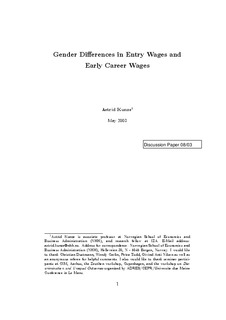| dc.contributor.author | Kunze, Astrid | |
| dc.date.accessioned | 2006-08-08T07:11:10Z | |
| dc.date.available | 2006-08-08T07:11:10Z | |
| dc.date.issued | 2003-05 | |
| dc.identifier.issn | 0804-6824 | |
| dc.identifier.uri | http://hdl.handle.net/11250/163286 | |
| dc.description.abstract | This paper investigates the gender wage gap in entry wages and in the
early career for German skilled workers in the period 1975-1990. We use
a new administrative longitudinal data source that allows to observe complete
work and skill accumulation histories from the beginning for up to 13
years in the labour market. Descriptives show an entry wage differential of
22 percent between male and female full-time workers. Furthermore, the
differential stays almost constant throughout the first 8 eight years in the
labour market. Among the factors that explain the entry wage gap, premarket
choices of training schemes are found to be particular important.
Gender differences in the timing of work account only for a small fraction of the gap during the early years of the career. | en |
| dc.format.extent | 357949 bytes | |
| dc.format.mimetype | application/pdf | |
| dc.language.iso | eng | en |
| dc.publisher | Norwegian School of Economics and Business Administration. Department of Economics | en |
| dc.relation.ispartofseries | Discussion paper | en |
| dc.relation.ispartofseries | 2003:8 | en |
| dc.subject | male-female wage differentials | en |
| dc.subject | entry wages | en |
| dc.subject | apprenticeship training | en |
| dc.subject | work experience | en |
| dc.title | Gender differences in entry wages and early career wages | en |
| dc.type | Working paper | en |
